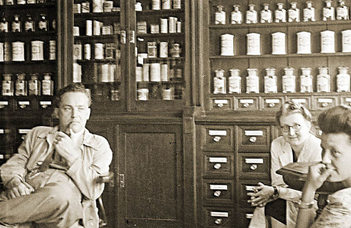Healing Professions Workshop III.
Summary of Gergely Magos' presentation
2021.04.04.

Gergeky Magos
The "emancipation" efforts of pharmacists as paramedical actors
How to capture the relationship between different health professions? What has characterised the relationship between pharmacists and physicians in the past?
A recurrent complaint of pharmacists was their subordination to physicians. As it was put in 1869, 'the pharmacist is a subordinate and a real pariah of the physician'. The self-image of subordination can be traced back to two basic factors.
On the one hand, the supervisor or supervisory position of physicians, since the work of pharmacists was controlled by physicians. In order to overcome the autonomy deficit, pharmacists sought to assert sovereignty over professional matters. They demanded that pharmacists should finally carry out pharmacy examinations, which had been the responsibility of physicians since the 18th century. Another way of extending their autonomy was to give them greater representation in political decision-making, so that physicians would finally stop deciding on matters that affected pharmacists. They called for legal representation in government (e.g. the establishment of an independent pharmacy department) or the appointment of pharmacist officials at local level.
A recurrent complaint of pharmacists was their subordination to physicians. As it was put in 1869, 'the pharmacist is a subordinate and a real pariah of the physician'. The self-image of subordination can be traced back to two basic factors.
On the one hand, the supervisor or supervisory position of physicians, since the work of pharmacists was controlled by physicians. In order to overcome the autonomy deficit, pharmacists sought to assert sovereignty over professional matters. They demanded that pharmacists should finally carry out pharmacy examinations, which had been the responsibility of physicians since the 18th century. Another way of extending their autonomy was to give them greater representation in political decision-making, so that physicians would finally stop deciding on matters that affected pharmacists. They called for legal representation in government (e.g. the establishment of an independent pharmacy department) or the appointment of pharmacist officials at local level.
The pariah fate of the pharmacist's self-image, on the other hand, can be traced back to the relative lack of rank of pharmacists compared to physicians. Pharmacists aimed to achieve the same social esteem as physicians. This is illustrated by the fact that as early as 1848, in the spirit of 'civic equality', they called for the renaming of the university's medical faculty as a 'faculty of medicine and pharmacy'. The other heartache of the pharmacists was the academic title of 'master' (magister pharmaciae), which they considered to refer to the 'rank of industrialist' and therefore unworthy of a graduate. The aspirations for promotion came relatively late. In 1940, the 4-semester university course was extended to 8 semesters, making pharmacists full graduates. The provision also had a beneficial effect on the social status of pharmacists. The title of master was abolished and in 1944 pharmacists serving in the army were given the rank of officer, like physicians.

